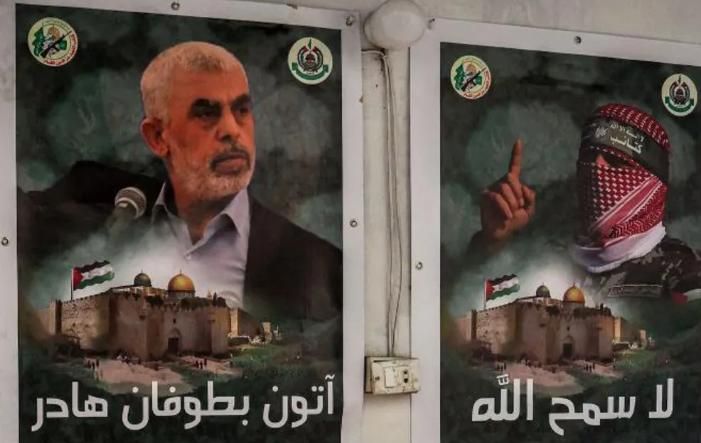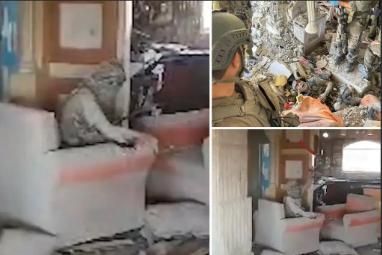By Eric Vandenbroeck and co-workers
The Control Of Gaza, Hostage
Release, And Ceasefire Talks
The death of Hamas
military leader Yahya Sinwar will have implications for the structure
and dynamics of Hamas’s leadership, its strategic trajectory, and the future control of Gaza, as well as hostage release and
ceasefire talks.
If new dynamics
created by Sinwar’s killing can be leveraged toward a ceasefire, this could
have implications for ending the war in Lebanon. Such a shift would deprive
Iran of two of its most valuable regional assets and, in doing so, diminish its
pernicious influence in the region. All these developments create new
potential, but the U.S. administration will need to take the initiative and
grasp the opportunity.

Hamas leader Yahya
Sinwar’s killing in Gaza is a major win for Israel following a year-long
manhunt for the man believed to be the mastermind of the deadliest terror
attack in the country’s history.
And it could bring
the devastating war in Gaza closer to an end, experts say – if Israel and
its allies can seize the opportunity.
Sinwar’s death could
be a fatal blow for Hamas because of the way he ran the group.
Before the war, power
in Hamas was decentralized – with Gaza political chief Sinwar just one of many
leaders, but that changed over the past year.
Sinwar became the
sole decision maker, and of course, he grew stronger and stronger as Israel
killed more and more important figures, such as, also a military
leader, Mohammed Deif.
A year of pounding by
Israel, which has left swathes of Gaza devastated and brought a huge toll on
civilians, has left Hamas greatly weakened and Sinwar’s killing will create a
major power vacuum – which Israel and its allies will no doubt aim to capitalize
on.
Pictures of the Hamas leader down in his bunker at the
time of his killing

It is unclear whether
Sinwar left any instructions on what should happen in the event of
his death.
Several names have been
floated as possible successors, including Sinwar’s brother Mohammed,
who is seen as another hardliner, and Khalil Al Hayya, chief
negotiator for Hamas during ceasefire talks in Cairo. Neither has Sinwar’s
public profile in Gaza.
But Israel better
take advantage of this situation and the major confusion that is probably
spreading among the ranks of Hamas.
Netanyahu has
insisted his goal is to eliminate Hamas, even though many experts have warned
this may not be achievable.
Hamas might be
greatly weakened, but it is still capable of firing rockets toward Israel.
Meanwhile, the Israeli military recently re-entered northern Gaza, saying
Hamas was reemerging in the area.
Sinwar’s killing
could also pave the way for a hostage and ceasefire agreement since he was
believed to be one of the main blockers of a deal.
Sinwar had little
personal incentive to negotiate, given that he was Israel’s No. 1 target.
If Netanyahu does not
take advantage of the momentum and does not stand up now and present a new
Israeli initiative, even at the cost of ending the war, means that he has
decided to abandon the hostages, to prolong the war and fortify his rule.
What Happens Next Thus Will Largely Depend On Netanyahu.
The long-time prime
minister has been trying to juggle the demands of his far-right coalition
partners with pressures from the United States and Israel’s other allies to
strike a ceasefire deal and minimize the devastating cost of the war on
civilians in Gaza.
Critics of
Netanyahu, including US President Joe Biden,
have long voiced concerns that he may be dragging out the war in Gaza in an
attempt to cling to power, something the Israeli leader has denied.
While still hugely
unpopular among a large portion of Israeli society, Netanyahu has staged a
remarkable turnaround over the past year, clawing back some of the support he
had lost over the years.
Netanyahu has in the
past insisted on Israel maintaining some military presence in Gaza after the
immediate conflict is over. And some of his coalition partners have gone as far
as suggesting Israel should build Jewish settlements inside Gaza.
Rabi said he believed
some level of Israeli military presence would be needed to prevent Hamas from
rebuilding itself in the strip – something Israel’s allies have warned the
government against.
“You have to take
control of the civilian infrastructure to empty Hamas of its authority and its
legitimacy in the eyes of the Gazans,” he said.
For updates click hompage here